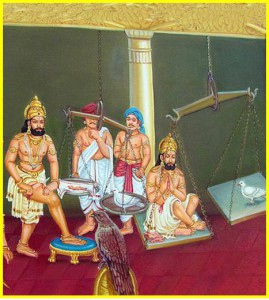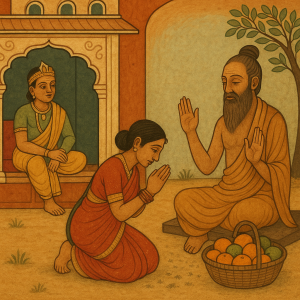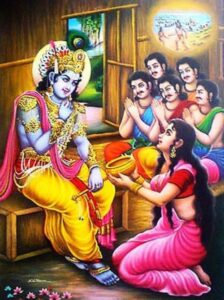Narada’s Rules for the Pandavas and Draupadi
Narada, suggested some rules for the Pandavas and Draupadi to follow for harmonious living. One of the rules was that Draupadi should spend one year with each of the Pandavas, and while she was with one of them, no other Pandava should visit the palace where they might be. In case of any breach of this rule, a one-year pilgrimage was prescribed as penance, requiring the offender to leave the kingdom.
The Brahmana’s Plea and Arjuna’s Dilemma
The Pandavas and Draupadi were living happily until one day a brahmana came running to Arjuna, saying that thieves had stolen his cows. Arjuna wanted to rush with him to catch the thieves but realized that his bow and arrows were kept in Yudhisthira’s palace, where Draupadi was staying with Yudhisthira.
Arjuna’s Decision
Arjuna hesitated for a while but, seeing the brahmana’s plight, he rushed into Yudhisthira’s palace, took his bow and arrows, and ran to catch the thieves. After catching the thieves and restoring the cows to the brahmana, Arjuna returned to Yudhisthira and confessed his transgression.
Yudhisthira’s Response
Yudhisthira, understanding the reason behind Arjuna’s breach of the rule, said there was no need for Arjuna to take the pilgrimage. He reasoned that since the mistake was committed towards him, and for a good reason, he would pardon Arjuna. However, Arjuna, committed to his word, immediately set out for a one-year pilgrimage.
Arjuna’s Commitment and Krishna’s Favor
This unwavering commitment to his word is perhaps why Arjuna is such a favorite friend (sakha) of Lord Krishna.
Morals in the Story
- The Importance of Keeping One’s Word:
- The story shows how crucial it is to keep one’s word, regardless of the consequences or the difficulty involved. Arjuna adhered to his promise even when it meant leaving the kingdom and undergoing hardship.
- Duty Above All:
- Arjuna knew he would be punished for breaching the rule but did not shirk his duty as a king to protect his people and punish the thieves. One must always perform their duty without laziness or fear.
- Truth and Integrity:
- Rewards for such people often appear as immediate difficulties, but in the end, truth prevails (Satyameva Jayate). Arjuna’s victory was in gaining eternal friendship with Lord Krishna.
- Impact of Truthfulness on Society:
- Imagine if everyone kept their word and always spoke the truth. There would be no corruption or poverty. Though difficult to inculcate, truthfulness is essential for genuine development.
- Temporal Gains vs. Long-term Integrity:
- Temporal gains obtained through lies are never permanent. They bring us down in the long run and prevent us from winning the heart of the Lord. Like Arjuna, if everyone performs their duty with integrity, society would progress much faster.
Always Remember
Maintaining truth and integrity in our actions and words is paramount. By following Arjuna’s example, we can lead a life of honor and duty, ultimately earning the favor and friendship of the divine.



